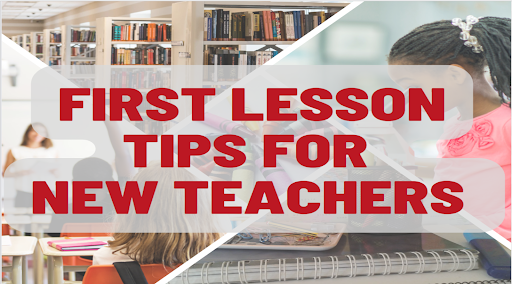Alternate Route Candidates Share Their First Lesson Tips for New Teachers

To help new candidates gain real-life teaching skills, Rutgers Alternate Route requires them to complete a pre-professional experience that consists of planning and delivering guest lessons. This requirement allows candidates to apply their textbook knowledge to classroom situations, grow from the challenges, and expand their instructional strategies.
In response to the global pandemic, many of our recent candidates had to pivot to virtual lessons, a challenge that has drastically improved their technological dexterity. Candidates rose to the challenge to deliver engaging and thoughtful lessons, followed by robust reflections detailing what they learned.
Below we’ve captured some interesting advice on organization, differentiation of learning, engagement and more.
Get Organized
Before stepping foot in the classroom, it's essential that new teachers get organized. Many candidates in our program realized a need for increased preparation. By sharpening their organizational skills, our candidates’ lessons flow seamlessly from instruction to activities and assessments.
These candidates shared their reflections on getting organized.
“Make sure everything is ready ahead of time, be more mobile, and practice prior to class.”
Andrew B., Chemistry
“It was mostly the quick switching back and forth with different programs in technology that threw me – I learned that while I am familiar with the different resources, I need to do better with being able to switch back and forth effortlessly.”
Barbara C., Chemistry
“To run through the complete lesson well in advance to anticipate any hiccups; that there is often more prep/more materials required for virtual learning than in a face-to-face class.”
Patricia E., Spanish
“I also learned how to adjust the materials used if it is going to be online, so that it is more easily viewable for the students on the other end of the camera.”
Jennifer S., Elementary
“With a higher-level class, I would need to adjust the standards, as well as making the lesson a little more differentiated. I could include a video to engage with guided questions. I could have also included partner or group work more. I also need to have both hard and electronic copies of the necessary information for the class in the future to avoid setbacks with technology.”
Cameron C., Social Studies
Remember, Every Student Learns Differently
These candidates learned that knowing academic content is not enough for an effective lesson. A teacher should also know their students and be mindful of how they learn best. Below, our candidates reflect on getting to know their students better.
“Students are more willing to participate if they can interact with you and the resources/tools being used. The sign-language video was a big hit with the students because they got to sing and learn the letters. I should include more interactive things in my lesson to help all my students learn better.”
Neha M., Elementary
“With proper connection to the students’ experiences, material that is unfamiliar can be made approachable. I will strive to look for these connections in the future.”
Edward S., Physical Science
“Students feel safer and confident when the expectations are clearly given to them. What I learned from this experience is that even when the assignment is simple, expectations and procedures should be very detailed.”
Nilgun A., Theater
“Another thing I learned from this experience is using multiple learning strategies in conjunction with one another, which will serve as I create more and more effective and diverse lesson plans targeting differentiation to meet student needs.”
Kyle M., Social Studies
“I learned that it is really important to know the language level of the students, which may differ regardless of the fact that they might be in the same grade.”
Gul C., ESL
Pace Yourself & Keep Track of Time
Many teachers found themselves wondering "Where did the time go?" These candidates learned that effectively pacing the various activities in a lesson is just as important as the content and delivery.
“Time management is definitely something that I am still learning. Most of the time, I did not finish all the activities I had planned, because we were short of time.”
Maria del Pilar M., ESL
“I feel like there’s a lot of energy at the beginning of the year to go as quickly as possible, however, I need to pace myself so that no student feels overwhelmed or left behind. My main job right now is to create a positive learning atmosphere that will keep the students engaged ”
Michael V., Latin
“Finally, making sure to spread out the lessons instead of trying to teach it all in one shot and understanding that if the lesson plan isn’t complete within the time allotted, that it is OK and that we should teach at the pace of how the students are learning.”
Jaslin K. S., Physics
“The students had a good understanding of the previously learned skills needed for the new task, but I underestimated the time needed for them to connect these individual skills. They didn’t have as much time for independent practice at the end. In the future, I might split a lesson like this over two days.”
Salvatore R., Elementary
“I learned that I need to be more realistic about the pacing of lessons and allow extra time for questions and/or comments”
Angela G., Elementary
Make Your Lesson Fun and Engaging
These candidates learned that teaching can be a fun experience for both the students and instructors. Fun can be maximized when lessons are thoroughly planned, engage students, and incorporate different resources.
“I learned that no matter the subject, I need to keep the energy upbeat and keep children engaged using different tools and strategies. I also learned that it can be beneficial to the lesson to let students give input and ideas, even if it was not outlined in the plan.”
Camille W., Elementary
“I learned that charts and images help students comprehend topics in science. I also learned that asking questions helped keep students engaged.”
Ayesha Z., Biological Science
“I also want to lift students' responses to each other’s ideas by either adding on or agreeing/disagreeing to create more genuine conversation.”
Danae R., Elementary
“I quickly learned that regularly asking students questions keeps them listening and engaged. I think stopping to get their feedback and listen to their contributions was really useful for everyone involved, as well.”
Lexie N., Elementary
“It reinforced how well students respond to hands-on activities. While writing and listening are important, including hands-on activities is also beneficial. Also, viewing current videos and tying them in with a lesson activity bolsters learning. Students love it when technology is included in the form of a film.”
Marcia G., Spanish
Interesting Insights
While mentors and instructors can be great advisors to new teachers, experience is one of the best resources for development. These teachers made various new discoveries that may serve their peers who are also new to the teaching profession.
“I hadn’t thought to model how to answer the questions I was asking. I gave hints and prompted some of the participation. I could practice delivering the answers I think they should give to provide students with a verbal model analogous, in a way, to my modeling-of-drawing technique.”
Todd B., Art
“I learned the importance of being able to pivot and having a backup plan. The students were not able to move to group work/guided practice as quickly as I anticipated, so I extended the time we spent working together and, when they were ready to move to the group work, lowered the number of examples I asked them to locate in the text.”
Breanne L., English
“I learned that teaching requires a lot of patience, and a lot of planning. You have to prepare
for the unexpected, especially when you're teaching at a younger grade level. I also learned that it is so important to have differentiated teaching strategies at hand because you never know what student will have a hard time understanding the content.”
Caitlyn B., Elementary
“The methods from the teacher toolkit are incredibly helpful, as well as the ability to watch myself in a recorded setting. It is far more effective to be able to watch myself make mistakes and assess how I can improve rather than trying to recall a flaw in a completed lesson from memory.”
Maria C., Elementary
“A lot of times, students ask ‘When will we use information?’ The biggest takeaway is that students will be more engaged if a teacher decides to make those modern connections.”
Darnell H., Elementary
Our hope is that our teacher candidates apply the knowledge and advice they’ve gained from their peers into their teaching methods to further improve and maximize students' learning potential.
If you’re considering following your dream of teaching, Rutgers Alternate Route can offer you the support and training you need to succeed. Be sure to follow Rutgers Alternate Route on Twitter and sign up for Alternate Route’s monthly newsletter for more information and stories from the field of education.

 Heather Ngoma has over 25 years of experience collaborating with educators across New Jersey to drive education innovation. She currently serves as the Director of the Rutgers-GSE Alternate Route Program in the Department of Learning and Teaching, a program which helps career changers, recent college graduates, and other aspiring education professionals become licensed teachers in New Jersey. Follow her on Twitter @heatherngoma.
Heather Ngoma has over 25 years of experience collaborating with educators across New Jersey to drive education innovation. She currently serves as the Director of the Rutgers-GSE Alternate Route Program in the Department of Learning and Teaching, a program which helps career changers, recent college graduates, and other aspiring education professionals become licensed teachers in New Jersey. Follow her on Twitter @heatherngoma.





